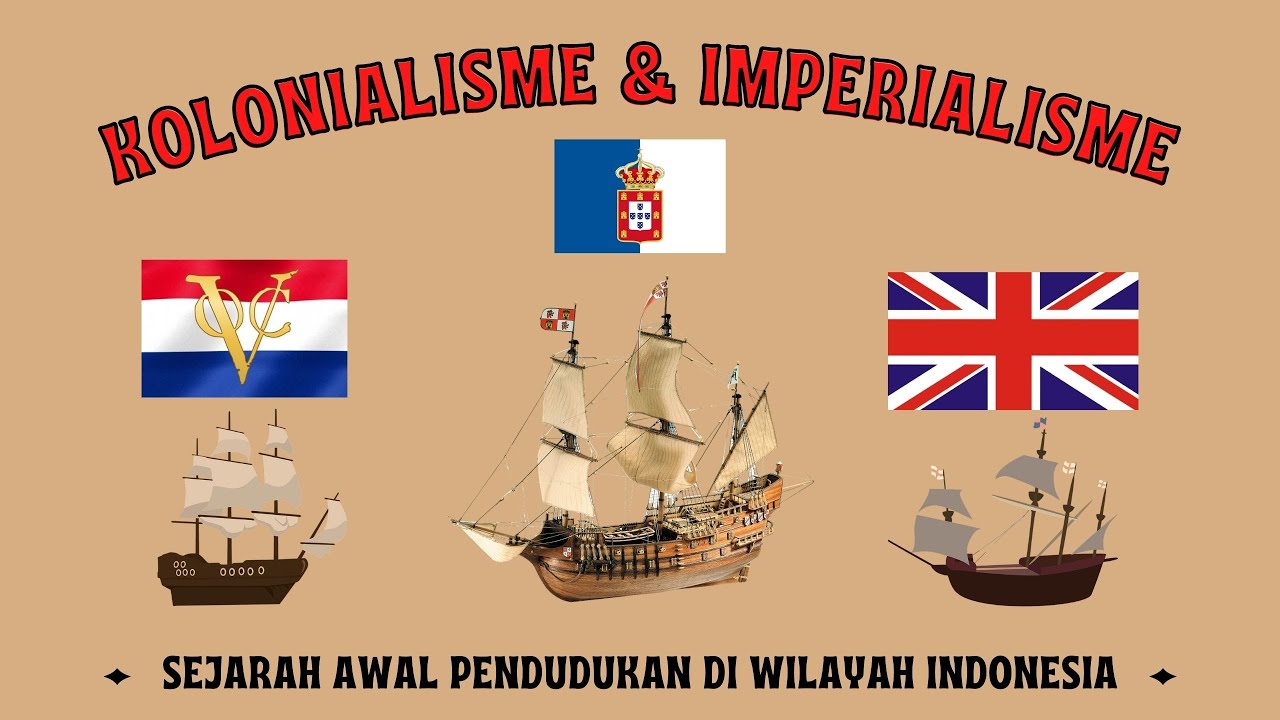Kisah Penjajahan Belanda di Indonesia Pada Abad 16 | IPS | SayaBisa
Summary
TLDRThis video explores the history of Dutch colonialism in Indonesia, beginning with European traders' initial arrival in the late 16th century to seek valuable spices. It highlights the transition from trade to exploitation, detailing the establishment of the Dutch East India Company (VOC) in 1602 and its monopoly over spice trade. The VOC's strategies, including divide-and-conquer politics among local kingdoms, are discussed, along with the eventual decline of the company's power by the late 18th century, leading to direct Dutch control over Indonesia. The narrative sets the stage for deeper exploration of resistance against colonial rule.
Takeaways
- 🌍 European nations initially arrived in Indonesia for trade, seeking valuable spices not available in Europe.
- 🥢 Spices were essential for medicine, food seasoning, and preservation.
- ⛴️ The Dutch were the first Europeans to arrive in Indonesia in 1596, led by Cornelis de Houtman.
- 🤝 Initially, the Dutch attempted to maintain friendly relations but soon became greedy and aggressive.
- 😡 The local population in Banten resisted Dutch advances, leading to the Dutch's return to their homeland.
- 🚢 The Dutch made a second visit in 1598, with Jacob van Neck leading the expedition.
- 📈 Between 1596 and 1601, about 65 Dutch trading ships entered Indonesian waters.
- 🛡️ The Dutch established the Dutch East India Company (VOC) on March 20, 1602, to dominate trade and maximize profits.
- 📜 The VOC was granted monopoly rights to make treaties, declare war, and manage trade with local rulers.
- 💣 The VOC's aggressive tactics, including 'divide and conquer' politics, led to widespread resistance from Indonesian kingdoms.
Q & A
What initially motivated European nations to come to Indonesia?
-European nations initially came to Indonesia to trade, particularly to seek out spices that were hard to find in their cold climates. These spices were valuable for medicine, flavoring food, and preserving food.
Which European countries are mentioned as having come to Indonesia?
-The European countries mentioned in the transcript are Portugal, Spain, England, and the Netherlands.
Who was the leader of the first Dutch expedition to Indonesia in 1596?
-The leader of the first Dutch expedition to Indonesia in 1596 was Cornelis de Houtman.
What was the main goal of the Dutch when they first arrived in Indonesia?
-The main goal of the Dutch when they first arrived in Indonesia was to buy spices and engage in trade.
How did the local population respond to the Dutch's initial friendly approach?
-Initially, the Dutch showed a friendly attitude, but as their behavior became greedy and aggressive, the local population, particularly in Banten, became angry and refused to welcome them.
What significant event happened on March 20, 1602, related to Dutch trade in Indonesia?
-On March 20, 1602, the Dutch government established the Dutch East India Company (VOC) to maximize profits and combat competition in the spice trade.
What powers were granted to the VOC by the Dutch government?
-The VOC was granted monopoly rights to negotiate treaties with local kings, declare war and peace, produce weapons, build forts, mint money, and hire and fire employees.
What changes occurred in the governance of the VOC in terms of location and leadership?
-Initially, the VOC's first Governor-General was stationed in Ambon, but later, the center was moved to Jayakarta (now Jakarta) on May 31, 1619, with a new Governor-General, Jan Pieterszoon Coen.
What strategy did the VOC use to maintain control over Indonesian kingdoms?
-The VOC used a divide-and-conquer strategy, encouraging rivalries among Indonesian kingdoms and pretending to support one side, forcing them to submit to Dutch authority.
What led to the dissolution of the VOC in 1799?
-The VOC faced financial difficulties and ultimately went bankrupt, leading to its dissolution on December 31, 1799, after which the Dutch government took over its powers in Indonesia.
Outlines

هذا القسم متوفر فقط للمشتركين. يرجى الترقية للوصول إلى هذه الميزة.
قم بالترقية الآنMindmap

هذا القسم متوفر فقط للمشتركين. يرجى الترقية للوصول إلى هذه الميزة.
قم بالترقية الآنKeywords

هذا القسم متوفر فقط للمشتركين. يرجى الترقية للوصول إلى هذه الميزة.
قم بالترقية الآنHighlights

هذا القسم متوفر فقط للمشتركين. يرجى الترقية للوصول إلى هذه الميزة.
قم بالترقية الآنTranscripts

هذا القسم متوفر فقط للمشتركين. يرجى الترقية للوصول إلى هذه الميزة.
قم بالترقية الآنتصفح المزيد من مقاطع الفيديو ذات الصلة

SEJARAH KOLONIALISME & IMPERIALISME DI INDONESIA

Rangkuman IPAS Kelas 6 Bab 2 Cerita Tentang Indonesia Kita. Topik A: Kedatangan Bangsa-Bangsa Asing

Kedatangan Bangsa Bangsa Asing Ke Nusantara

Video Animasi Kedatangan Bangsa Barat ke Indonesia Abad 15

Masa Penjajahan Hingga Tumbuhnya Semangat Kebangsaan | IPS SMP

Sejarah Penjajahan Pemerintahan Belanda Pasca Bubarnya VOC
5.0 / 5 (0 votes)
